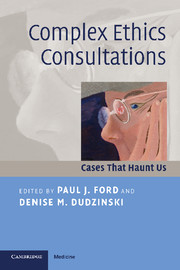Book contents
- Frontmatter
- Contents
- List of contributors
- Foreword
- Acknowledgments
- Introduction: Live and learn: courage, honesty, and vulnerability
- Part I Starting at the beginning: prenatal and neonatal issues
- Part II The most vulnerable of us: pediatrics
- Part III Diversity of desires and limits of liberty: psychiatric and psychological issues
- Part IV Withholding therapy with a twist
- Part V The unspeakable/unassailable: religious and cultural beliefs
- 17 Adolescent pregnancy, confidentiality, and culture
- 18 “Tanya, the one with Jonathan's kidney”: a living unrelated donor case of church associates
- 19 Futility, Islam, and death
- 20 Suffering as God's will
- Part VI Human guinea pigs and miracles: clinical innovations and unorthodox treatment
- Part VII The big picture: organizational issues
- Conclusions, educational activities, and references
- Index
18 - “Tanya, the one with Jonathan's kidney”: a living unrelated donor case of church associates
Published online by Cambridge University Press: 03 May 2010
- Frontmatter
- Contents
- List of contributors
- Foreword
- Acknowledgments
- Introduction: Live and learn: courage, honesty, and vulnerability
- Part I Starting at the beginning: prenatal and neonatal issues
- Part II The most vulnerable of us: pediatrics
- Part III Diversity of desires and limits of liberty: psychiatric and psychological issues
- Part IV Withholding therapy with a twist
- Part V The unspeakable/unassailable: religious and cultural beliefs
- 17 Adolescent pregnancy, confidentiality, and culture
- 18 “Tanya, the one with Jonathan's kidney”: a living unrelated donor case of church associates
- 19 Futility, Islam, and death
- 20 Suffering as God's will
- Part VI Human guinea pigs and miracles: clinical innovations and unorthodox treatment
- Part VII The big picture: organizational issues
- Conclusions, educational activities, and references
- Index
Summary
Case narrative
An ethics consult was requested of me in my role as a fellow in transplantation ethics. It came from the kidney-transplant coordinator in regard to a potential living unrelated donor (LURD). Apparently the donor had minimal knowledge of and relationship to her intended recipient.
The case first came up for consideration in the transplant team's weekly meeting early in January. Transplant coordinator Callie Jenkins, RN, presented Tanya Keller's case following Ms. Keller's donor evaluation a few days earlier. The case required ethics input because of the potential donor's relational status to Jonathan Noble, the intended recipient with end-stage renal disease. Ms. Keller was said to be a “church associate” of Mr. Noble.
“What are our criteria for living donor acceptance?” asked a senior nephrologist, with a nod to the ethicist in attendance. “Uncoerced, not paid, understands the procedure, good health.” The physician had answered his own question. Shortly afterward, the transplant coordinator sent me a letter formally requesting an ethics consult:
Ms. Tanya Keller is a 31-year-old woman who has expressed a wish to donate a kidney to one of our patients, Jonathan Noble. She has been tissue typed and found to be a compatible match to Jonathan. Tanya describes herself as a church acquaintance/friend of Jonathan's. They have known each other awhile, though she does not describe their relationship as close.
Ms. Keller has not had the complete medical donor evaluation yet, but in our preliminary medical inquiry she sounds like a healthy candidate. Her reasons for wanting to donate seem sound. We have asked Tanya to see you to help her explore the full implication of kidney donation. […]
- Type
- Chapter
- Information
- Complex Ethics ConsultationsCases that Haunt Us, pp. 141 - 147Publisher: Cambridge University PressPrint publication year: 2008



